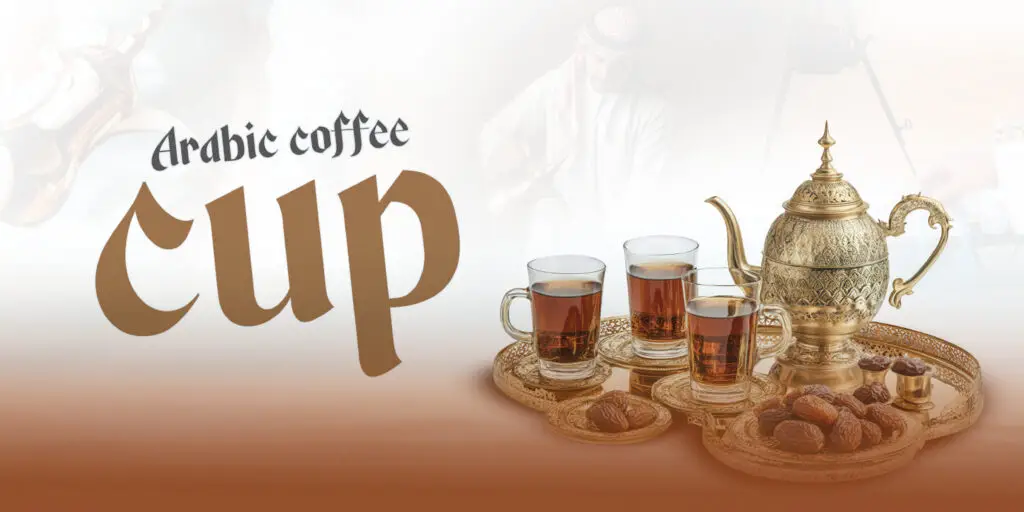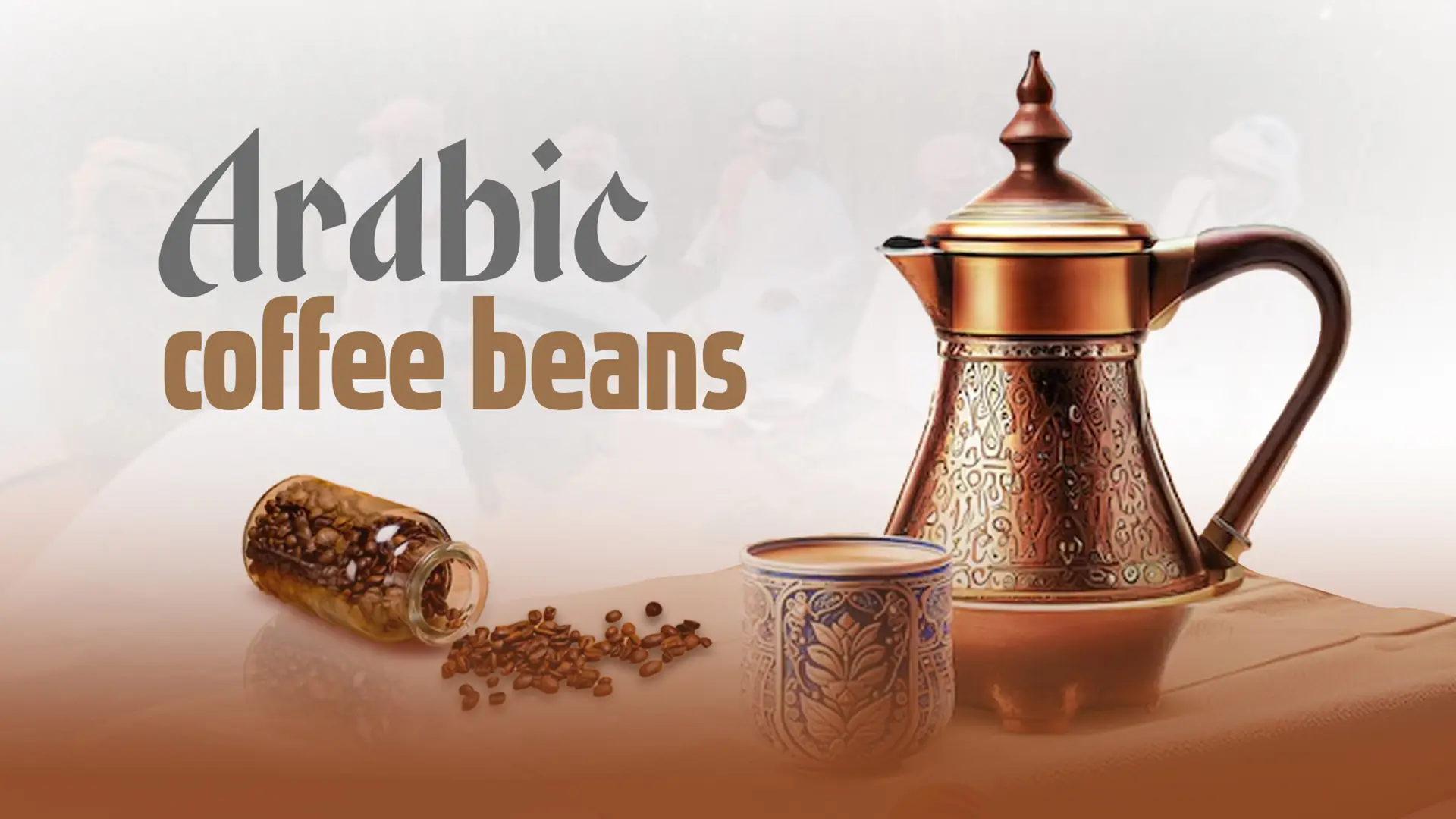Light vs Dark Roast Coffee: What Every Coffee Lover Should Know Light vs Dark Roast Coffee: What Every Coffee Lover...
Read MoreArabic Coffee History That Will Fascinate You

Arabic Coffee History That Will Fascinate You


What is Arabic coffee?
Arabic coffee, or Qahwa, is a traditional beverage with deep roots within Middle Eastern culture. It is lightly roasted and contains spices, often cardamom. Arabic coffee is typically served without milk and has a strong, fragrant taste, unlike Western coffee. It is a central element of hospitality, an expression of camaraderie and generosity. The preparation consists of boiling very finely ground coffee beans, resulting in a strong brew served in small cups. Arabic coffee: a drink that brings people together with its taste and tradition that span generations, experienced for its cultural importance and flavor.
Arabica Coffee Plants: The Source of Smooth Flavor
Introduction to Arabica coffee plants
Arabica coffee plants are native to some of the most popular coffee varieties found in the world. Arabica coffee plants grow in high areas and are best known for their cooler temperatures and minimum soil richness. These beans come from the microlots produced by the lovely people there and are known for their mellow flavor and low acidity. Arabica coffee is usually characterized by more complex tasting notes, including fruit and floral notes. Arabica beans are difficult to grow and harvest, leading to a premium end product. Arabica coffee plants are among the most delicious varieties in the world, and as a favorite among coffee drinkers, Arabica plays a key role in the global economy, producing thousands of hours of experience in cups all across the globe.
Why Arabica beans are used in traditional Arabic coffee
Traditional Arabic coffee is made using Arabica beans, as these produce a smooth flavor and aroma. These beans have lower caffeine and mild acidity, making for a wonderful drinking experience. Their rich taste is directly related to Arabica plants being raised under sometimes unique conditions, typically in high-altitude regions. In preparing Arabic coffee, beans are roasted only lightly, bringing out their natural sweetness and floral notes. Coffee bean varieties Tasting Arabica beans also works well with spices, such as cardamom, making them perfect for traditional recipes. This blend of taste and custom makes Arabica the foundation of genuine Arabic coffee culture.
Growing regions and climate conditions of Arabic coffee
When it comes to Arabic coffee, the regions where it’s grown and the surrounding climate conditions are key for the production of quality beans. Arabic coffee grows in high-altitude regions, usually between 2,000 and 6,000 feet above sea level. Countries such as Ethiopia, Yemen, and Brazil are renowned for their lush coffee-growing regions. Their abundant rainfall and well-drained soil in high-altitude regions produce an ideal climate for the delicate Arabica plants. The climate is an important factor in forming the flavor profile of the beans, which is one of the things that gives the beans their unique flavor. All these factors are the pillars of Arabic coffee, appreciated by thousands around the globe.
Arabic Coffee Beans: What Makes Them So Unique?
Origin of Arabic coffee beans (Yemen, Ethiopia, etc.)
The Arabic coffee bean’s origin is traced back to Yemen and Ethiopia, where, centuries ago, coffee culture began. As a result, Arabic coffee beans are different as they are cultivated in their own specific conditions and have their own history. Yemen’s eastern high-altitude farms offer beans with varied and complex flavors; Ethiopia’s myriad of climates heightens the fruit forwardness and floral notes of its beans. In addition, the traditional methods of processing in these parts contribute to the unique profiles of the beans. What are Arabic coffee beans? Why are they so special? Their superb drinkability internationally comes from the background.
Light roast vs. dark roast in Arabic coffee tradition
In the Arabic tradition of coffee, the choices available concerning the level of roasting are the main reason for how dark or light the coffee’s roast is; the authentic preparation, however, remains in a light roast. Beans roasted to light maintain a lot of their natural flavors, with floral, fruity, and even tea-like tasting notes that blend beautifully with a traditional Arabic spice palette. This preference is deeply rooted in the region’s climate and cultural practices, since lighter roasts yield a more refreshing brew best for hot weather. Dark roasts tend to overwhelm the delicate spices with their strong bitterness and smoky notes, but light roasts meld into cardamom, saffron, and cloves beautifully. It’s a practice that has been passed down for centuries, illustrating the Middle Eastern love of delicate, complex coffee flavors that elevate the social act of sharing coffee.

Types of Arabic Coffee Cups: Symbolism in Every Sip
Explore the cultural significance of Arabic coffee cups.
The Arabic coffee cups, known as “finjans,” encapsulate centuries of hospitality evenings and the cultural heritage of the Middle East. These small, handleless vessels are not just drinking vessels; they signify respect, generosity, and social bonds in Arab society. Whether it’s the elaborate Dallah cups from the Gulf, richly decorated with engravings, or the colorful ceramic cups from the Levant, including traditional motifs and calligraphy, each style narrates a different legacy. Even the serving of coffee in the finjans follows an exact protocol, including serving the most revered guests first and keeping to certain levels of filling. They are still bridging together the past and present in modern settings, from luxury hotels to contemporary cafés today, serving an authentic cultural experience while upholding traditional values.
Description of traditional Dallah and Finjan cups
The Dallah is a traditional Arabic coffee pot made from finely polished brass or stainless steel; it has a long, elegant spout and a unique bent handle. This pot is for when you want to brew and serve Arabic coffee, a symbol of hospitality and warmth. The Finjan cups accompany the Dallah, which are small, handleless vessels that contain Arabic coffee. Finjan cups are uniquely designed, often decorated with beautiful patterns and bright colors that showcase cultural artistry. They are usually served at a determined fill level so that guests can appreciate the depth of the coffee’s taste. The Dallah and Finjan serve up a special coffee experience steeped in tradition.

How to Brew Arabic Coffee the Traditional Way
Step-by-step brewing method
Brewing Arabic coffee in the traditional manner is a step-by-step process that pulls out its rich flavors. Choose high-quality Arabic coffee beans, preferably roasted light. Use a fine grind, similar to powdered sugar. Then boil water in a Dallah (Arabic coffee pot). Add the ground coffee, generally one tablespoon per cup, and give a gentle stir. Let the mixture bubble away for a minute or so, then take it off the heat. To infuse it with flavor, you can add spices, such as cardamom. Then transfer the coffee into Finjan cups and serve immediately; it will be a taste of your tradition.
What makes Arabic coffee preparation unique?
Arabic coffee preparation is a unique ritual that reflects rich cultural traditions. In contrast to normal coffee brewing processes, Arabic coffee utilizes ground beans, occasionally blended with spices such as cardamom and saffron, which compound the aromatic properties of the resulting beverage. Their coffee is brewed in a Dallah, an ornate pot that is a symbol of hospitality. Instead of boiling, this method involves simmering the coffee gently, allowing for the flavors to fully develop. Serving is just as important; coffee is poured into petite Finjan cups and stems with the intent to build social relationships. This slow and deliberate ritual of brewing Arabic coffee is a treasured tradition, building community around a shared love of stories exchanged between mouthfuls, both on the small and grand scale.
Arabic Coffee vs. Arabica Coffee - What’s the Difference?
Clarify confusion between Arabic coffee and Arabica coffee.
Arabic kola and Arabica coffee are mixed up by many when they actually mean two completely different things. Arabic coffee: A traditional style of preparation consumed in the Middle East, Arabic coffee is made from lightly roasted beans and is often flavored with cardamom or spices and served in Finjan cups. Arabica coffee, on the other hand, is a specific type of coffee bean from the Coffee Arabica plant, recognized for its mild acidity and smooth flavor. Most Arabic coffee is made of Arabica beans, but this is not the same as saying these terms are interchangeable. Arabic coffee vs. Arabica coffee is a confusion based on the difference between a cultural practice or tradition and a species of coffee.
Explain why Arabica beans are common but not the same as Arabic coffee.
Arabica beans are the most common coffee variety grown in the world, known for their smooth flavor and aromatic properties. But be careful to not confuse Arabica beans with Arabic coffee. Note: The Arabica beans used in Arabic coffee tend to be of different varieties from those used elsewhere, but they are otherwise different from regular coffee primarily when it comes to how they are made and what they mean culturally. Arabic coffee is a traditional beverage prepared from a blend of lightly roasted, spiced beans, such as with cardamom. It emphasizes hospitality and social connection instead. So, while the Arabic beans are often higher than many types of coffee drinks, Arabic coffee is distinct, where the culture and history of Middle Eastern coffee are made sharper.
Health Benefits of Arabic Coffee
Natural energy booster without the crash
Say goodbye to the dreaded sugar crash that comes with sugary energy drinks, because Arabic coffee is a natural energy booster with sustained alertness. Crafted from lightly roasted Arabica beans, it features moderate levels of caffeine that boost focus and energy without undesired agitation. The Benarasi method is traditional, with spices including cardamom, which provides antioxidants and aids digestion. Arabic coffee is devoid of additives, unlike many processed drinks. Its slow-release caffeine means an uninterrupted energy source, ideal for marathon days. Not only that, but Arabic coffee also has health effects that make it a timeless functional beverage paired with the cultural significance.
How spices enhance health benefits
Arabic coffee is well known for its health benefits and is complemented by spices that play a key role here, giving the drink much of its flavor and nutritional additions. Cardamom, saffron, and cinnamon are among the frequently used ingredients, and they all provide health-promoting qualities. Cardamom helps with digestion and oral health, and saffron is popular for mood-boosting properties as well as reducing anxiety. The anti-inflammatory properties of cinnamon help regulate blood sugar levels. These spices work in harmony with the natural antioxidant properties of the coffee, resulting in a beverage that nourishes the whole person. Using spices in Arabic coffee is a tasty method to increase flavor as well as the health benefits of the coffee, making every sip a nourishing beverage experience.
Arabic Coffee in the Modern World
Growing popularity outside the Middle East
Arabian coffee has begun to gain traction outside of the Middle East, as more coffee lovers seek to expand their palates. The trend toward specialty coffee experiences around the world is providing an opportunity for many newcomers to discover the rich and flavor-forward experience of Arabic coffee. Overwhelmingly, specialty coffee shops are now serving authentic preparations, introducing patrons to the sublime experience of lightly roasted beans spiced with cardamom and other flavors. The preparation of Arabic coffee is also a popular art on social media platforms, helping to make it more desirable. Furthermore, cultural events and festivals around this traditional drink help break down barriers between cultures. Therefore, the modern resurgence of Arabic coffee can be considered a testament to its timeless appeal and continued relevance in today’s global coffee scene.
Specialty cafes and brands offering Arabic blends
With the advent of specialty cafes, we have also seen a renewed interest around Arabic blends, which has introduced some of these coffee experiences to a much wider audience. Many cafés serve traditional Arabic coffee using the traditional brewing techniques to take advantage of the rich flavor derived from using lightly roasted beans and spices. Specialist Arabic coffee brands are springing up, providing high-end blends that are in keeping with traditional approaches yet cater to contemporary palates. Besides offering Arabic coffee, these specialized cafés also explain the cultural and health values of it for customers. These places are also dedicated to making it as real and good as possible, serving as ambassadors for Arabic coffee that in the future will find itself in other marketplaces around the globe.
Recap of cultural, culinary, and sensory aspects of Arabic coffee
Arabic coffee is not just a beverage; it’s a cultural, culinary, and sensory occasion, a cup that speaks to the essence of Middle Eastern customs. Stories in the serving of Arabic coffee from your Dallah, pouring up in Finjan cups. Spices like cardamom are added to create a richer sensory experience, each sip lingering. In addition to flavor, Arabic coffee represents togetherness, respect, and hospitality. With its rising global popularity, this ancient ritual continues to connect worlds, capturing the essence of Arabic tradition one cup at a time.
Popular Posts
Instant Espresso: Enjoy Rich Espresso Anytime, Anywhere
The Ultimate Guide to Espresso Beans: What You Need to Know The Ultimate Guide to Espresso Beans: What You Need...
Read MoreHazelnut Coffee: A Perfect Blend of Nutty and Sweet Flavors
Hazelnut Coffee: Everything You Need to Know for a Perfect Brew Hazelnut Coffee: Everything You Need to Know for a...
Read MoreDiscover the Best Espresso Coffee for Rich, Bold Flavors
Master the Art of Espresso Coffee: Secrets to the Perfect Brew Master the Art of Espresso Coffee: Secrets to the...
Read MoreCortado Coffee: A Perfect Balance of Espresso and Milk
Cortado Coffee: A Perfect Harmony of Espresso and Milk! Cortado Coffee: A Perfect Harmony of Espresso and Milk! Introduction A...
Read More
What is Arabic coffee?
Arabic coffee, or Qahwa, is a traditional beverage with deep roots within Middle Eastern culture. It is lightly roasted and contains spices, often cardamom. Arabic coffee is typically served without milk and has a strong, fragrant taste, unlike Western coffee. It is a central element of hospitality, an expression of camaraderie and generosity. The preparation consists of boiling very finely ground coffee beans, resulting in a strong brew served in small cups. Arabic coffee: a drink that brings people together with its taste and tradition that span generations, experienced for its cultural importance and flavor.
Arabica Coffee Plants: The Source of Smooth Flavor
Introduction to Arabica coffee plants
Arabica coffee plants are native to some of the most popular coffee varieties found in the world. Arabica coffee plants grow in high areas and are best known for their cooler temperatures and minimum soil richness. These beans come from the microlots produced by the lovely people there and are known for their mellow flavor and low acidity. Arabica coffee is usually characterized by more complex tasting notes, including fruit and floral notes. Arabica beans are difficult to grow and harvest, leading to a premium end product. Arabica coffee plants are among the most delicious varieties in the world, and as a favorite among coffee drinkers, Arabica plays a key role in the global economy, producing thousands of hours of experience in cups all across the globe.
Why Arabica beans are used in traditional Arabic coffee
Traditional Arabic coffee is made using Arabica beans, as these produce a smooth flavor and aroma. These beans have lower caffeine and mild acidity, making for a wonderful drinking experience. Their rich taste is directly related to Arabica plants being raised under sometimes unique conditions, typically in high-altitude regions. In preparing Arabic coffee, beans are roasted only lightly, bringing out their natural sweetness and floral notes. Coffee bean varieties Tasting Arabica beans also works well with spices, such as cardamom, making them perfect for traditional recipes. This blend of taste and custom makes Arabica the foundation of genuine Arabic coffee culture.
Growing regions and climate conditions of Arabic coffee
When it comes to Arabic coffee, the regions where it’s grown and the surrounding climate conditions are key for the production of quality beans. Arabic coffee grows in high-altitude regions, usually between 2,000 and 6,000 feet above sea level. Countries such as Ethiopia, Yemen, and Brazil are renowned for their lush coffee-growing regions. Their abundant rainfall and well-drained soil in high-altitude regions produce an ideal climate for the delicate Arabica plants. The climate is an important factor in forming the flavor profile of the beans, which is one of the things that gives the beans their unique flavor. All these factors are the pillars of Arabic coffee, appreciated by thousands around the globe.
Arabic Coffee Beans: What Makes Them So Unique?
Origin of Arabic coffee beans (Yemen, Ethiopia, etc.)
The Arabic coffee bean’s origin is traced back to Yemen and Ethiopia, where, centuries ago, coffee culture began. As a result, Arabic coffee beans are different as they are cultivated in their own specific conditions and have their own history. Yemen’s eastern high-altitude farms offer beans with varied and complex flavors; Ethiopia’s myriad of climates heightens the fruit forwardness and floral notes of its beans. In addition, the traditional methods of processing in these parts contribute to the unique profiles of the beans. What are Arabic coffee beans? Why are they so special? Their superb drinkability internationally comes from the background.
Light roast vs. dark roast in Arabic coffee tradition
In the Arabic tradition of coffee, the choices available concerning the level of roasting are the main reason for how dark or light the coffee’s roast is; the authentic preparation, however, remains in a light roast. Beans roasted to light maintain a lot of their natural flavors, with floral, fruity, and even tea-like tasting notes that blend beautifully with a traditional Arabic spice palette. This preference is deeply rooted in the region’s climate and cultural practices, since lighter roasts yield a more refreshing brew best for hot weather. Dark roasts tend to overwhelm the delicate spices with their strong bitterness and smoky notes, but light roasts meld into cardamom, saffron, and cloves beautifully. It’s a practice that has been passed down for centuries, illustrating the Middle Eastern love of delicate, complex coffee flavors that elevate the social act of sharing coffee.

Types of Arabic Coffee Cups: Symbolism in Every Sip
Explore the cultural significance of Arabic coffee cups.
The Arabic coffee cups, known as “finjans,” encapsulate centuries of hospitality evenings and the cultural heritage of the Middle East. These small, handleless vessels are not just drinking vessels; they signify respect, generosity, and social bonds in Arab society. Whether it’s the elaborate Dallah cups from the Gulf, richly decorated with engravings, or the colorful ceramic cups from the Levant, including traditional motifs and calligraphy, each style narrates a different legacy. Even the serving of coffee in the finjans follows an exact protocol, including serving the most revered guests first and keeping to certain levels of filling. They are still bridging together the past and present in modern settings, from luxury hotels to contemporary cafés today, serving an authentic cultural experience while upholding traditional values.
Description of traditional Dallah and Finjan cups
The Dallah is a traditional Arabic coffee pot made from finely polished brass or stainless steel; it has a long, elegant spout and a unique bent handle. This pot is for when you want to brew and serve Arabic coffee, a symbol of hospitality and warmth. The Finjan cups accompany the Dallah, which are small, handleless vessels that contain Arabic coffee. Finjan cups are uniquely designed, often decorated with beautiful patterns and bright colors that showcase cultural artistry. They are usually served at a determined fill level so that guests can appreciate the depth of the coffee’s taste. The Dallah and Finjan serve up a special coffee experience steeped in tradition.

How to Brew Arabic Coffee the Traditional Way
Step-by-step brewing method
Brewing Arabic coffee in the traditional manner is a step-by-step process that pulls out its rich flavors. Choose high-quality Arabic coffee beans, preferably roasted light. Use a fine grind, similar to powdered sugar. Then boil water in a Dallah (Arabic coffee pot). Add the ground coffee, generally one tablespoon per cup, and give a gentle stir. Let the mixture bubble away for a minute or so, then take it off the heat. To infuse it with flavor, you can add spices, such as cardamom. Then transfer the coffee into Finjan cups and serve immediately; it will be a taste of your tradition.
What makes Arabic coffee preparation unique?
Arabic coffee preparation is a unique ritual that reflects rich cultural traditions. In contrast to normal coffee brewing processes, Arabic coffee utilizes ground beans, occasionally blended with spices such as cardamom and saffron, which compound the aromatic properties of the resulting beverage. Their coffee is brewed in a Dallah, an ornate pot that is a symbol of hospitality. Instead of boiling, this method involves simmering the coffee gently, allowing for the flavors to fully develop. Serving is just as important; coffee is poured into petite Finjan cups and stems with the intent to build social relationships. This slow and deliberate ritual of brewing Arabic coffee is a treasured tradition, building community around a shared love of stories exchanged between mouthfuls, both on the small and grand scale.
Arabic Coffee vs. Arabica Coffee - What’s the Difference?
Clarify confusion between Arabic coffee and Arabica coffee.
Arabic kola and Arabica coffee are mixed up by many when they actually mean two completely different things. Arabic coffee: A traditional style of preparation consumed in the Middle East, Arabic coffee is made from lightly roasted beans and is often flavored with cardamom or spices and served in Finjan cups. Arabica coffee, on the other hand, is a specific type of coffee bean from the Coffee Arabica plant, recognized for its mild acidity and smooth flavor. Most Arabic coffee is made of Arabica beans, but this is not the same as saying these terms are interchangeable. Arabic coffee vs. Arabica coffee is a confusion based on the difference between a cultural practice or tradition and a species of coffee.
Explain why Arabica beans are common but not the same as Arabic coffee.
Arabica beans are the most common coffee variety grown in the world, known for their smooth flavor and aromatic properties. But be careful to not confuse Arabica beans with Arabic coffee. Note: The Arabica beans used in Arabic coffee tend to be of different varieties from those used elsewhere, but they are otherwise different from regular coffee primarily when it comes to how they are made and what they mean culturally. Arabic coffee is a traditional beverage prepared from a blend of lightly roasted, spiced beans, such as with cardamom. It emphasizes hospitality and social connection instead. So, while the Arabic beans are often higher than many types of coffee drinks, Arabic coffee is distinct, where the culture and history of Middle Eastern coffee are made sharper.
Health Benefits of Arabic Coffee
Natural energy booster without the crash
Say goodbye to the dreaded sugar crash that comes with sugary energy drinks, because Arabic coffee is a natural energy booster with sustained alertness. Crafted from lightly roasted Arabica beans, it features moderate levels of caffeine that boost focus and energy without undesired agitation. The Benarasi method is traditional, with spices including cardamom, which provides antioxidants and aids digestion. Arabic coffee is devoid of additives, unlike many processed drinks. Its slow-release caffeine means an uninterrupted energy source, ideal for marathon days. Not only that, but Arabic coffee also has health effects that make it a timeless functional beverage paired with the cultural significance.
How spices enhance health benefits
Arabic coffee is well known for its health benefits and is complemented by spices that play a key role here, giving the drink much of its flavor and nutritional additions. Cardamom, saffron, and cinnamon are among the frequently used ingredients, and they all provide health-promoting qualities. Cardamom helps with digestion and oral health, and saffron is popular for mood-boosting properties as well as reducing anxiety. The anti-inflammatory properties of cinnamon help regulate blood sugar levels. These spices work in harmony with the natural antioxidant properties of the coffee, resulting in a beverage that nourishes the whole person. Using spices in Arabic coffee is a tasty method to increase flavor as well as the health benefits of the coffee, making every sip a nourishing beverage experience.
Arabic Coffee in the Modern World
Growing popularity outside the Middle East
Arabian coffee has begun to gain traction outside of the Middle East, as more coffee lovers seek to expand their palates. The trend toward specialty coffee experiences around the world is providing an opportunity for many newcomers to discover the rich and flavor-forward experience of Arabic coffee. Overwhelmingly, specialty coffee shops are now serving authentic preparations, introducing patrons to the sublime experience of lightly roasted beans spiced with cardamom and other flavors. The preparation of Arabic coffee is also a popular art on social media platforms, helping to make it more desirable. Furthermore, cultural events and festivals around this traditional drink help break down barriers between cultures. Therefore, the modern resurgence of Arabic coffee can be considered a testament to its timeless appeal and continued relevance in today’s global coffee scene.
Specialty cafes and brands offering Arabic blends
With the advent of specialty cafes, we have also seen a renewed interest around Arabic blends, which has introduced some of these coffee experiences to a much wider audience. Many cafés serve traditional Arabic coffee using the traditional brewing techniques to take advantage of the rich flavor derived from using lightly roasted beans and spices. Specialist Arabic coffee brands are springing up, providing high-end blends that are in keeping with traditional approaches yet cater to contemporary palates. Besides offering Arabic coffee, these specialized cafés also explain the cultural and health values of it for customers. These places are also dedicated to making it as real and good as possible, serving as ambassadors for Arabic coffee that in the future will find itself in other marketplaces around the globe.
Recap of cultural, culinary, and sensory aspects of Arabic coffee
Arabic coffee is not just a beverage; it’s a cultural, culinary, and sensory occasion, a cup that speaks to the essence of Middle Eastern customs. Stories in the serving of Arabic coffee from your Dallah, pouring up in Finjan cups. Spices like cardamom are added to create a richer sensory experience, each sip lingering. In addition to flavor, Arabic coffee represents togetherness, respect, and hospitality. With its rising global popularity, this ancient ritual continues to connect worlds, capturing the essence of Arabic tradition one cup at a time.
Popular Posts
Carbs in Coffee: What’s Really in Your Cup?
Carbs in Coffee: What You Need to Know Before Your Next Cup Carbs in Coffee: What You Need to Know...
Read MoreBreve Coffee: A Creamy Delight for Coffee Lovers
5 Surprising Benefits of Drinking Breve Coffee Daily 5 Surprising Benefits of Drinking Breve Coffee Daily Introduction Briefly introduce what...
Read MoreCoffee Beans: Discover the Best Beans for Every Brew
Unlocking the Secrets of Coffee Beans: Types, Roasting, and Brewing Unlocking the Secrets of Coffee Beans: Types, Roasting, and Brewing...
Read MoreChildren’s Coffee: A Kid-Friendly Coffee Alternative
Childrens Coffee That Supports Brain and Body Growt Childrens Coffee That Supports Brain and Body Growt Introduction: Understanding Childrens Coffee...
Read MoreAmaretto Coffee: A Sweet, Nutty Twist on Your Favorite Brew
How to Make the Best Amaretto Coffee: Delicious Recipes & Syrup Guide How to Make the Best Amaretto Coffee: Delicious...
Read MoreDiscover the Best Espresso Coffee for Rich, Bold Flavors
Master the Art of Espresso Coffee: Secrets to the Perfect Brew Master the Art of Espresso Coffee: Secrets to the...
Read More










